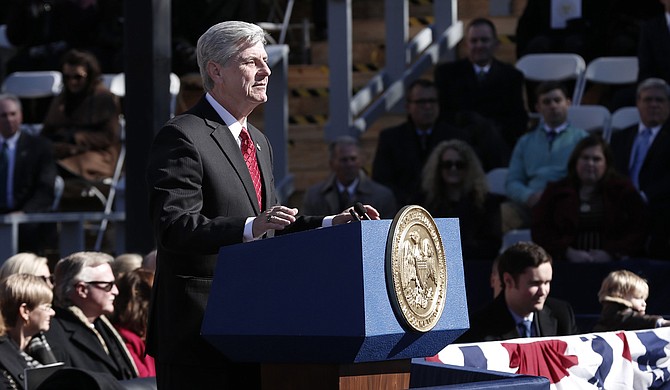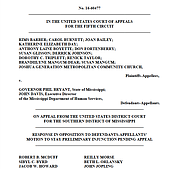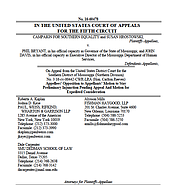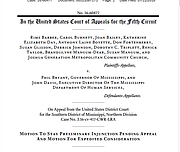Gov. Phil Bryant and John Davis, the executive director of the Mississippi Department of Human Services, have asked the 5th U.S. Circuit Court of Appeals for expedited consideration of their appeal to allow House Bill 1523 to go into effect. Photo by Imani Khayyam.
JACKSON — Gov. Phil Bryant and John Davis, the executive director of the Mississippi Department of Human Services, have asked the 5th U.S. Circuit Court of Appeals to stay the lower court's preliminary injunction that blocked House Bill 1523 from becoming law on June 30. Bryant and Davis have also asked the 5th Circuit for expedited consideration of their case.
Represented by lawyers from their respective offices, the Alliance Defending Freedom and the James Otis Law Group in Missouri, Bryant and Davis claim that because the preliminary injunction was filed at 11:23 p.m. on the night before HB 1523 became law, the state was deprived of an opportunity to seek appellate review.
"The harm to the State has been compounded by the astonishing nature of the district court's ruling, which held that the State lacked a rational basis for enacting a law that protects the conscientious scruples of its citizens, and held further that a State violates the establishment clause when it enacts legislation to protect or accommodate an enumerated conscientious belief," their motion states.
Bryant and Davis' motion says that HB 1523 is "carefully crafted and exceedingly limited in its scope." They compare HB 1523's purpose of protecting religious and conscientious freedom to the statutes that protect "the conscientious scruples of abortion opponents." They also say that Mississippi has not established a religion by enacting the bill.
"Opponents of same-sex marriage can be found in every faith tradition and religious denomination, and the statute protects all of them—including non-believers whose conscientious objections rest exclusively on secular moral beliefs. So how can this be an establishment of religion? And if so, what is the religion that the State has established?" their brief asks.
Plaintiffs filed responses to the state's motion Monday, asking the 5th Circuit to deny the governor's motion to stay the preliminary injunction and expedited appeal. In the Campaign for Southern Equality brief, Roberta Kaplan writes that HB 1523 does not merely reinforce the First Amendment but instead singles out three specific religious beliefs "for official State endorsement, but it [also] permits (even encourages) discrimination."
"To give an example, at the hearing in the district court, Joce Pritchett, a lesbian and lifelong Mississippian, shared harrowing experiences—for example, that gay men in northern Mississippi have, since HB 1523 was enacted, become afraid to go out to dinner together. She further testified that, after HB 1523 was enacted, the 6-year-old daughter of her friends was shamed by her public school teacher in the classroom simply for having married lesbian parents," her brief states.
Mississippi plaintiffs, represented by Rob McDuff in their brief, argue that the governor has not demonstrated irreparable harm because U.S. District Judge Carlton Reeves blocked the bill from becoming law.
"(T)he District Court properly held that the plaintiffs will likely succeed in their challenge to it. Federal court decisions recognizing the right of equal treatment—like Brown, Loving, and Obergefell—do not justify a statute giving special rights to those who oppose that equal treatment," McDuff's brief states. "Obviously, people are still entitled to their own religious beliefs, but they are not entitled to the endorsement of those beliefs by the State and the provision of special legal privileges that are not available to others."
The 5th Circuit will now have to decide whether or not to grant the governor's request to stay the preliminary injunction and grant the case expedited consideration.
For more on HB 1523's history in the Legislature visit www.jfp.ms/lgbt. Email reporter Arielle Dreher at arielle@jacksonfreepress.com.
More like this story
- Gov. Bryant Alone Appeals HB 1523, Wants 'Special Protections and Accommodations'
- Governor Name-checks Jackson in HB 1523 Brief, Dismisses LGBT Worries as 'Parade of Horribles'
- HB 1523 Opponents Fight Back, Say Law Gives 'Special Rights'
- Legal Fight Against HB 1523 Continues
- What the ‘Bryant Documents’ Say About HB 1523, Its Future






Comments
Use the comment form below to begin a discussion about this content.